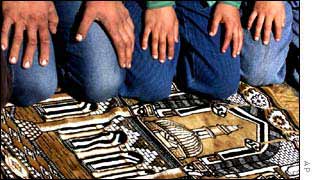| You are in: UK | ||||||||||||||||||||||||||||||||||||||||||||||||||||||||||||||||||||||||||||||||||||||||||||||||||||||||||||||||||||||||||||||||||||||||||||||||||||||||||||||||||
|
Thursday, 29 August, 2002, 11:56 GMT 12:56 UK
UK 'Islamophobia' rises after 11 September

An academic survey of racist incidents in Leicester supports fears that the UK is witnessing a rise in Islamophobia - fear or intolerance of Muslims because of their religion. Earlier in the year, a European Union anti-racism research agency warned there was anecdotal evidence of a rise in Islamophobia. The research by the University of Leicester is the first detailed study into the actual effects of 11 September on a Muslim community. Research findings Racist and religious attacks in Leicester rose dramatically after 11 September, the university's research found, before dropping back during 2002.
One man reported that he had eggs thrown at him outside a supermarket and then had to run as a car was driven at him. Another victim reported that he had had to get off a bus after another passenger screamed accusations that he was a bomber. The research also found that Hindus and Sikhs also suffered increased abuse after 11 September, although not to the same degree. Dr Lorraine Sheridan who conducted the research for the university, said that she had been shocked by what she had found. "The attacks are being carried out by people who don't like Islam, the abuse is more about the religion than the race. "They think that it victimises women and that Muslims refuse to integrate.
"What is of most concern is that this is happening in Leicester, a leading multi-ethnic city which is supposed to be a model for the rest of the UK." Suleman Nagdi of the Federation of Muslim Organisations in Leicester, said that while incidences of attacks had now fallen, the community had been shaken by attacks - but many remained reluctant to report them. "Many of the attacks that came after 11 September were against women in the street," said Mr Nagdi. "They presented an easy target because people could identify their religion by their headscarves." 'Silent majority' Mr Nagdi said that all mosques and community groups in the city had been put on alert to report incidents. "Within Leicester's ethnic minorities there is a silent majority," he said. "That means that many incidents go unreported. People are too timid to speak out by nature. "We have tried to encourage people to report the incidents to the police so that they can be dealt with." Leicester University surveyed the experiences of all the major religious faiths as part of the research which also included Stoke on Trent. The survey involved detailed questionnaires of experiences since 11 September 2001. Approximately 500 people responded, the overwhelming number being Muslims. The study examined levels of both racial and religious discrimination and incidences of "implicit" racism - where people may deny being racist but treat other ethnic minorities differently. Dr Sheridan said: "The British Crime Survey's own figures suggest that Pakistani and Bangladeshi communities suffer the most abuse. Our figures are the first attempt to look at this in depth in just one area. "But we need more research into this nationally to find out the true extent of Islamophobia."
Use this form to send us your comments on this story. They will be read by the author. After pressing submit, you will be directed to the front page.
|
See also:
24 May 02 | UK
29 Sep 01 | Politics
06 Nov 01 | UK
Internet links:
The BBC is not responsible for the content of external internet sites Top UK stories now:
Links to more UK stories are at the foot of the page.
|
||||||||||||||||||||||||||||||||||||||||||||||||||||||||||||||||||||||||||||||||||||||||||||||||||||||||||||||||||||||||||||||||||||||||||||||||||||||||||||||||
|
Links to more UK stories |
 |
||
| ----------------------------------------------------------------------------------
To BBC Sport>> | To BBC Weather>> | To BBC World Service>> ---------------------------------------------------------------------------------- © MMIII | News Sources | Privacy |